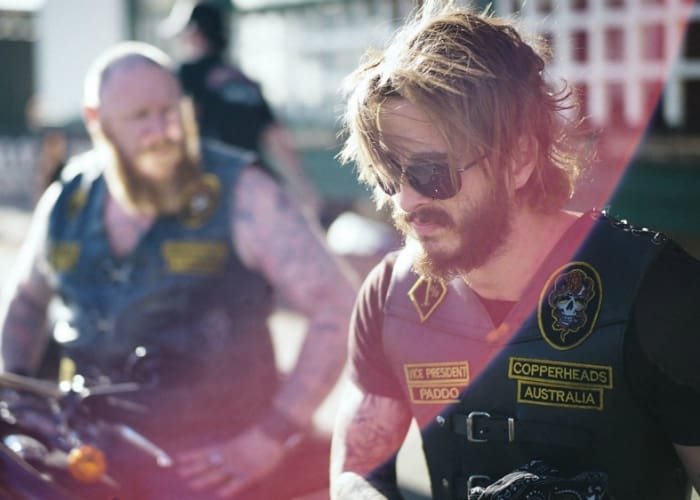
It’s amazing how a slight change of location can refresh even the most familiar formula. Outlaws, the debut feature from director Stephen McCallum, transports the Hell’s Angels mythology to the director’s native country and filters Hollywood biker tropes through an Australian lens. The result is something both familiar and unfamiliar; there are enough new ideas on display here to make Outlaws the target of a discerning studio like A24, but the film also doubles down on some of its worst ideas with frightening regularity. One could say it’s a throwback, just not in the ways its producers probably hoped.
For the past three years, Paddo (Ryan Corr) has served as the temporary president of a local motorcycle club as the rightful leader, Knuck (Matt Nable, who also wrote the film’s script), finished up a sentence at the local prison. However, just days before Knuck is set to be released, Paddo’s brother — the intellectually disabled Skink (Josh McConville) — is caught stealing heroin from a rival gang. Rather than shoot Skink, the gang leader offers Paddo an ultimatum: convince Knuck to join forces and launder his club’s money through his rival’s storefronts or the lives of both Skink and Paddo’s girlfriend Katrina (Abbey Lee) are forfeit.
This central conflict — between Paddo and Knuck —follows in some of the best traditions of the American crime film. While Paddo knows his brother’s life is forfeit if he cannot secure a deal with the rival motorcycle club, he also sees an opportunity to turn his club’s illegal paper trail into a legal revenue stream. Knuck, on the other hand, could care less about legitimacy or profit margins. His only concern is keeping his club independent and populated with the biggest, meanest men in the country. Outlaws even has a clever visualization for this battle between tradition and modernity: Paddo has replaced some of the gang’s leather jackets with cotton hoodies, and Knuck’s first order on his return is to make all the men throw their hoodies into the bonfire. “Fuck, I knew he wouldn’ta liked ‘em!” one veteran member laughs as he takes off his own.
For a movie about men, Outlaws is also most interesting when the focus is on its female characters. While Knuck put Paddo in charge of the club while he was in jail, it’s his wife Hayley — played by New Zealand actress Simone Kessell — who run their base of operations. Hayley is Knuck’s eyes and ears on the ground; her loyalty to her boyfriend is unwavering, and as the male characters pound and threaten, it is Hayley and Katrina who argue for the future of the club. Lee has a particular gift for playing characters that see more than her opponents; in both Mad Max: Fury Road and The Neon Demon, filmmakers use her slight frame to disguise a cunning and dangerous adversary, and that razor-sharp focus is on full display here.
As a result, Outlaws tries to make Lee its showcase by portraying Katrina as the Machiavellian character pulling strings in the background, but the return here is less pronounced. When Katrina works with Paddo — pitting her strengths against his weaknesses as both scheme to protect Skink from the rival gang — the film approaches a degree of complexity that does both relationship and political battle justice. It’s only when Katrina goes rogue and starts betraying her loved ones that the wheels come off. The disloyal partner is nothing new in the crime genre, and Nable’s script isn’t exactly the one to scratch out new ideas from a tired trope. Treating the disabled character as a terrible burden manages to be both regressive and boring, leaving some of the more interesting narrative ground untilled. How much more interesting would Outlaws had been if the film made Skink more a person than a plot device?
Of course, bad plot twists and tired character reveals can be forgiven as long as the rest of the script is both lean and mean, but Outlaws has one more delightfully bad choice in store for us. Much of Outlaws is focused on Knuck’s readjustment to life after prison; for Nable’s script, this means putting a spotlight on Knuck’s newfound preference for men and the panic this triggers within the motorcycle club. On paper, perhaps someone felt watching Knuck alternate homophobic tirades with acts of sexual violence was poignant; in practice, it’s a throwback to the worst instincts of exploitation cinema. Knuck is not a tragic character incapable of living his true life. He’s just a predator, written to (and from) our most shallow ‘insights’ about prison culture.
There’s a glimmer of promise in Outlaws, even as the script oscillates between ill-conceived and downright ignorant, but those enticed by the promise of Greek tragedy and Australian gang violence will be certainly underwhelmed. There’s not much to be said about a movie that uses issues like disability and homophobia as fuel for male posturing, especially given how well the movie works when it focuses more on the power struggle of modernity. Lesson learned: perhaps if your intended climax has a bunch of bikers shooting each other in the head, it’s best to know your lane (and stick to it).
Outlaws is currently available on most video-on-demand platforms, including Apple and Amazon.
Related Topics: A24

